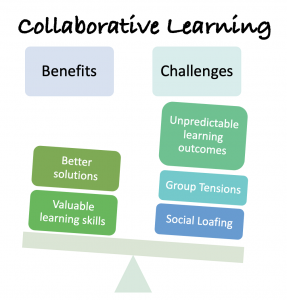Like the previous two topics, I believe that collaborative learning (CL) has a gradation of values. There must be a clear purpose for CL. In the right situation, the benefits of CL are indisputable. For e.g. in research, it will be inefficient for each researcher to work individually, making the same mistakes, duplicating data and findings. Collaboration is important t for research work. However, for a writer or novelist, collaboration is not so useful for the content part. For university courses, some collaboration is useful to help students learn skills needed for work – especially in communications, negotiations, social relationships. The challenges to the teacher include how to design courses for effective collaborative learning, how to assess students’ individual performance in group projects, etc. There will invariably be issues like social loafing; students benefit disproportionally from group work. My PBL group formulated a guide/template that aligns the ILOs of CL with the teaching methods, tools and types of assessments. We hope that it will be useful for teachers embarking on the journey to incorporate CL into their courses.

One response to “Topic 3: Collaborative Learning”
I find it interesting that you write about researchers. Just finished my PhD – a lot of work alone – to now try to find collaborative ways to continue my research. Collaboration is not only a topic in learning – but in many areas. Especially these complicated and complex times we live in.